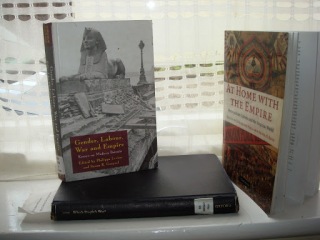Reading
At Home with the Empire, edited by Catherine Hall and Sonya O Rose;
Gender, Labour, War and Empire, edited by Philippa Levine and Susan R Grayzel, and
Which People’s War?, by Sonya O Rose. All for a forthcoming essay for my MA (the module is on migration to London, my essay is supposedly on interracial relationships, but I don’t know if I can go very far with that).

At Home with the Empirewas an interesting read; lots of chapters not directly relevant to my topic had something for me, which is unusual. The book tackles the subject of Britain’s Empire in the metropole, particularly tackling how ordinary people experienced Empire on a daily basis – for example, through consumption patterns, religion, and literature. The chapter on consumption, by Joanna de Groot, was probably the most interesting and accessible.
I find the arguments in Which People’s War? compelling and really enjoyed the methodology being explicated at the beginning, but I must admit I have some issues with the grammar that I find genuinely irritating – lots of commas where I wouldn’t put them and no commas where I would! Aside from this (which might be down to the publishing house style, who knows), it’s a fascinating exploration of the home front during the Second World War – something I know little about. Rose explores the ‘hegemonic wartime mood’ prevailing in Britain and links dominant discourses to wider concerns about citizenship through the lens of issues such as the sexual expression and freedom of young women, and the building of masculine identities.
My Tube read (apart from freesheets) has been
Working-class Wives, by
Margery Spring Rice. This was picked up for the dissertation, but since borrowing it I realised I didn’t want to take the topic into the 1930s; I decided to carry on and read it as it’s a very small book, ideal for the commute really (if I’m reading an ‘academic’ book I’ve usually strained my shoulder or back carrying it round!). In all honesty, even though it’s a contemporary report, which obviously offers a particular perspective on working-class women’s lives and these women’s struggles, I’ve read quite a few secondary works on working-class lives in the late 19
thand early 20
thcentury, especially with a focus on women, and didn’t feel this account added much to my existing knowledge. This is just for my personal use, of course – if anyone is looking at working-class lives in the 1930s, particularly those of housewives, this could still be a useful resource.
My favourite book about working-class women, incidentally, is the quite specific
Love and Toil: Motherhood in Outcast London, 1870-1918, by Ellen Ross. Of course it
isvery specific: it’s about a particular time period (slightly too early for my project, actually) and a particular location, London, and is particularly looking at motherhood. However, I am absolutely fascinated by the historicisation of motherhood and parenthood, and think it’s really important to see both as culturally bound and conditioned rather than natural and ‘given’. Ross’ book was therefore perfect for me: tightly written, well-argued, and with a good balance of analysis and explanation (i.e. facts, accounts and case studies), making this an excellent introduction to the topic for someone without a lot of existing knowledge (me!). There were some very interesting nuggets of information, such as the cultural creation of the ‘guilty’ mother. The idea that women, and especially mothers, feel perpetually guilty and unhappy is so normal, indeed normative, in media discourse today that it’s easy to think of it as natural, but Ross showed how guilty motherhood was constructed, partly because it was thought guilt could make women better mothers. I highly recommend this.
Listening to ‘Don’t Fence me In’, a Cole Porter song written in 1934. I wanted to listen to it after reading the following account in Sonya O Rose’s Which People’s War?(mentioned above):
“Many of the young women and girls [accused of being selfish due to their pleasure-seeking ways] continued to seek pleasure and adventure with soldiers throughout the war. Enmeshed in a popular culture that linked sex and love and valorised romance, they resisted a definition of citizenship that excluded carnal pleasure and passionate desire. The following front-page story appeared in the Sunday Pictorial at the end of August 1945: ‘The scene was Bristol, most English of all English cities. The time was 2am yesterday. The actors were a mob of screaming girls aged between 17 and 25.’ The cause of the ‘hysteria’ according to the report was that four companies of ‘American Negro soldiers in the city were leaving for home.’ ‘The girls besieged the barracks where the soldiers were and began singing “’Don’t Fence Me In.” This was too much for the coloured men who began to break down the barbed wire. In a few minutes hundreds of girls and US soldiers were kissing and embracing.’” (page 91)
Stripping away the obviously problematic, implicitly sexist and racist language used in the newspaper article, I was quite charmed by the story itself, thinking of these girls singing outside the barracks while their boyfriends inside broke out for a last embrace – very cinematic. I’d very much like to read the original article.
Buying this too-adorable-to-ignore fox and hedgehog mug (designed by
Jan Pashley), which I found in TK Maxx.
Save


